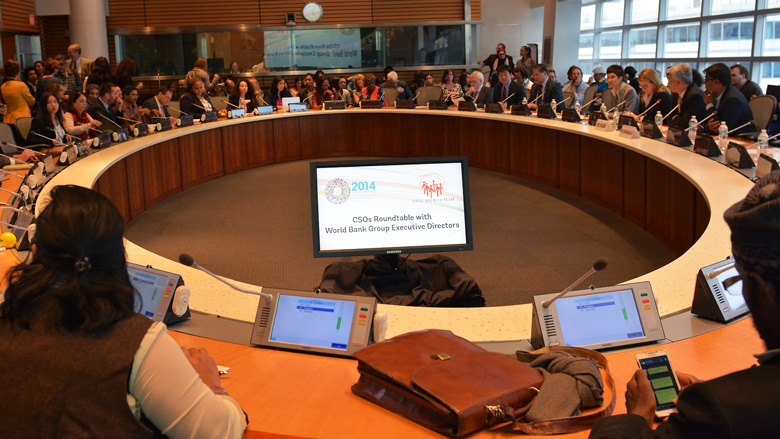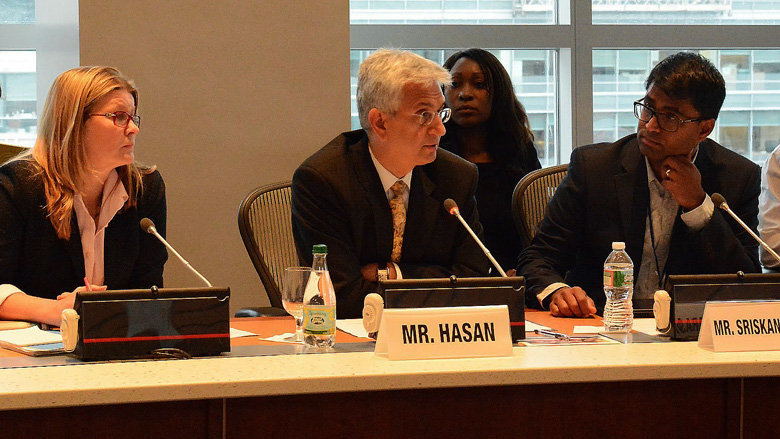The Annual Meetings Civil Society Roundtable with Executive Directors was held on Tuesday, October 7th, 2014. The purpose of the hour and a half plenary discussion, which has taken place at each Annual and Spring Meetings since 2011, is to foster policy dialogue and discussion between the World Bank Group Executive Directors (EDs) and Civil Society Organizations (CSOs) representatives. The Roundtable, which was attended by some 150 CSO representatives, enabled CSO representatives to convey their perspectives and ideas directly to members of the Bank’s governing body.
This year, a record nineteen Executive Director’s Offices (out of a total of 25) were represented at the Civil Society Roundtable. The Roundtable was co-chaired by Merza Hasan, who acts as ED for Kuwait and other Middle East Countries and also as Dean of the Board, alongside Dhananjayan (Danny) Sriskandarajah, Secretary General and CEO of CIVICUS, the World Alliance for Citizen Participation. Among the topics covered during the meeting were: the World Bank Group’s safeguards review; human rights; SOGI (sexual orientation and gender identity) issues; citizen engagement; corruption; gender; the BRICS Bank; and youth.
In his opening remarks, Mr. Hasan noted that the relationship between the World Bank Group and civil society has evolved considerably over the past few years. A telling sign of this, he said, is the ever-growing participation of civil society actors in the Annual and Spring Meetings, which have become an important forum for civil society representatives to engage in dialogue with Bank leadership, surface issues, and provide feedback on Bank projects and policies. Mr. Hasan noted that the very mechanisms by which the World Bank engages with civil society are evolving, with the introduction, for example, of individual ED office websites and country engagement links. These developments, he said, were in direct response to concerns surfaced about the EDs’ responsiveness to CSO feedback at the 2013 Spring Meetings ED Roundtable, illustrating the real impact and importance of this bi-annual event.
Mr. Sriskandarajah echoed this sentiment, adding that meetings like this one weren’t always a regular feature of the Annual and Spring Meetings agenda. He commended the Bank for its better-than-average engagement with CSOs, affirmed earlier this year by a report his organization published on how well ten International Organizations (including the World Bank) engage civil society. The Bank received high marks in comparison with many of its peers. CIVICUS has been one of the organizations driving engagement efforts between the Bank’s EDs and CSOs from the civil society side. As part of this agenda, CIVICUS created a scorecard to measure the openness and transparency of each ED’s office’s website. Mr. Sriskandarajah took the opportunity of the Roundtable to award top honors to Germany and Francophone Africa’s EDs offices, which capped the first iteration of the scorecard. Following the impromptu awards ceremony, Mr. Sriskandarajah concluded his remarks by introducing the first topic of discussion, the World Bank Group’s safeguards review. Mr. Hasan then opened the floor to questions.
Several CSO participants stated their disappointment with the draft safeguards statement that surfaced recently, expressing concerns about several key elements of the document. Many lamented perceived dilutions to the previous safeguards policy that the draft introduced. Some felt that the consultations process was restricted to capital cities and “5-star hotels,” therefore excluding those who would be truly affected by safeguards policies. Others were concerned that changes made to the policies would have reverberations throughout the international development community, potentially setting the wrong example for other multilateral development Banks. One participant expressed skepticism about the new policies’ adherence to and consistency with the UN human rights framework.


